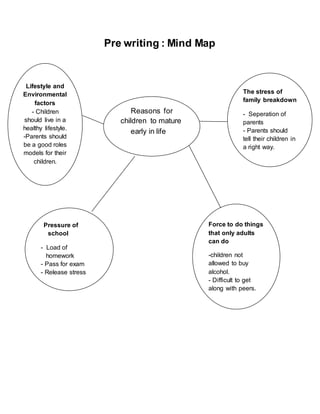
Reasons for Early Maturity
- 1. Pre writing : Mind Map Reasons for children to mature early in life Lifestyle and Environmental factors - Children should live in a healthy lifestyle. -Parents should be a good roles models for their children. The stress of family breakdown - Seperation of parents - Parents should tell their children in a right way. Pressure of school - Load of homework - Pass for exam - Release stress Force to do things that only adults can do -children not allowed to buy alcohol. - Difficult to get along with peers.
- 2. Reasons for children to mature early in life Nowadays, Children are influenced by what they see in the media, by the technology they are exposed to, and what they see in the environment around them. Children today like to act like an adult. They like to dress up like an adults , taking care their younger age siblings, watching movie with sex scenes. There are few reasons for children to early in life such as Lifestyle and Environmental factors, The stress of family breakdown, Pressure of school, Being force to do things that only adults can do . The first reason is Lifestyle and environmental factors of children. Children should live in a healthy lifestyle and every child has the right to live in a healthy and supportive environment to protect themselves. A child who lives in a healthy place will be happy, they will think positive whenever they are doing something or everything in their life. Parents should be a good role models and have a positive attitude to be active. Parents attitude will affect their children, children are just follow what their parents doing in daily life. It may makes them becomes very mature in a younger age. Secondly, the reason for children to mature early in life is the stress of family breakdown. The disturbed family life, with early separation from or death of a parent could be causing the children becomes mature in younger age. In this issue, the hardest task is how to tell their children about their problem. Parents should ask and listen to their children how they feel. They will probably feel the way so, they should also talk about their feelings. Children respond in different
- 3. ways to the separation and divorce of their parents. No matter how many or how sever the parents’ conflicts may have been, the children lose the common family they know. Children respond to this loss in various ways. They may feel sad, angry, guilty, physically sick, worried, or comforted. Furthermore, they may respond temporarily by forgetting skills they have learned, becoming very dependent upon adults, or trying to be more mature. (Parenting, 1980) The levels of divorce, as well as single parent families have quickly escalated in many countries. The third reason is pressure of school. The pressure of to do well and pass for exam from parents and teachers. Parents are too often very preoccupied with seeing their children succeed and intolerant of anything other than excellence (Daniel). This makes them to force themselves to do even better . They will think different way to force themselves . Stress can affect children’s growth. Parents and teachers should help them and give them advice to do even better. After they become successful, I’m sure they will appreciate what the parents and teachers have taught them. They will understand all their hardwork will paid off because they are smart and mature. Some of the children are still immature, they will hate their parents for sending them to school everyday. Besides that, they will also hate their teachers for giving them alots of homework. We should know what the parents and teachers doing are for our own good. The children should listen to them and the parents and teachers should also listen to the children. We can do some exercise activities to release our stress. Always remind ourself that we can and grow stronger from every hard times. Next, children being force to do things that only adults can do is also one of the cause. Children are young human beings. There are things that should not be done to them for the simple reason that they are human. At the same time children are different from adult human beings and it seems logical to think that there are things children may not do that adults are allowed to do. For example, children are not allow to marry, to buy alcohol, to smoke, to vote, to have sex and so on. (Archard, Plato.stanford.edu., 2002) Moreover, some of the children has became so mature because they have being force to do things that only adults can do. All this actions may affect same age children never did. In addition, people will think that they are very mature in such younger age and they will have difficult to get along with peers.
- 4. In conclusion, there are few reasons for children to early in life such as Lifestyle and Environmental factors, The stress of family breakdown, Pressure of school, Being force to do things that only adults can do . Children should not be too mature than what they should be at their age. A parents is always free to give advice to their children and support their children to become a better person. Reference Archard, D. W. (2002). Retrieved from ] Plato.stanford.edu. : http://plato.stanford.edu/entries/rights-children/ Daniel, J. (n.d.). Retrieved from Webmd.com: http://www.webmd.com/anxiety- panic/features/school-stress-anxiety-children Parenting. (1980). Retrieved from http://drwendyhart.com/pdfs/crtd.pdf